I have reading several AUTOSAR Documents. For now, my concern is just developing Software Component. I have two software component designs, take a look to the picture below.
Explanation:
- I got a data from port 1 and 2. Each of ports will correspondence with
RunnableEntitywhich running when a new data has come. Then, theRunnableEntitysets that data toInterRunnableVariable. The mainRunnableEntitywhich isRunnableEntity 1will process theInterRunnableVariableto make an output. - The data freely come to the port and waiting to be proceed in the buffer. Then, The only one
RunnableEntitywill process the data with some help by common global variable (The purpose of global variable is same withInterRunnableVariable).
My questions are,
- Will design 1 and 2 work?
- If design 1 and 2 are true, which one do you prefer according the time process, time to implement, etc.?
- Are the codes right? how to handle event and InterRunnableVariable?
Thank you for your help.
====================Adding Code After Comment========================
Design 1
/* Runnable Entity 1*/
/* Event : TimeEvent 25ms */
void re1(void){
data_output out;
irv irv1 = Rte_IrvIread_re1_irv1();
irv irv2 = Rte_IrvIread_re1_irv2();
irv irv3 = Rte_IrvIread_re1_irv3();
out = DataProcess(&irv1,&irv2,&irv3);
Rte_Write_re1_port3_out();
}
/* Runnable Entity 2*/
/* Event : DataReceiveErrorEvent on port1 */
void re2(void){
irv irv2 = Rte_IrvIread_re1_irv2();
modify(&irv2);
Rte_IrvIwrite_re1_irv2(irv2);
}
/* Runnable Entity 3*/
/* Event : DataReceiveEvent on port1 */
void re2(void){
data_input1 in;
Std_RetrunType status;
irv irv1 = Rte_IrvIread_re1_irv1();
status = Rte_Receive_re1_port1_input(&in);
if (status == RTE_E_OK) {
modify(&irv1,in);
Rte_IrvIwrite_re1_irv1(irv1);
}
}
/* Runnable Entity 4*/
/* Event : DataReceiveEvent on port2 */
void re2(void){
data_input2 in;
Std_RetrunType status;
irv irv3 = Rte_IrvIread_re1_irv3();
status = Rte_Receive_re1_port2_input2(&in);
if (status == RTE_E_OK) {
modify(&irv3,in2);
Rte_IrvIwrite_re1_irv3(irv3);
}
}
Design 2
/*Global Variable*/
global_variable1 gvar1; /* Equal with InterVariable 1 in Design 1*/
global_variable2 gvar2; /* Equal with InterVariable 2 in Design 1*/
global_variable3 gvar3; /* Equal with InterVariable 3 in Design 1*/
/* Runnable Entity 1*/
/* Event : TimeEvent 25ms */
void re1(void){
data_output out;
GetData1()
GetData2()
out = GetOutputWithGlobalVariable();
Rte_Write_re1_port3_out(out);
}
/* Get Data 1*/
void getData1(){
Std_ReturnType status; /* uint8 */
data_input1 in;
do {
status = Rte_Receive_re1_port1_input1(&in);
if (status == RTE_E_OK) {
modifyGlobalVariable(in);
}
} while (status != RTE_E_NO_DATA && status != RTE_E_LOST_DATA);
if(status != RTE_E_LOST_DATA){
modifyGlobalVariableWhenError();
}
return;
}
/* Get Data 2*/
void getData2(){
Std_ReturnType status; /* uint8 */
data_input2 in;
do {
status = Rte_Receive_re1_port2_input2(&in);
if (_status == RTE_E_OK) {
modifyGlobalVariable2(in);
}
} while (status != RTE_E_NO_DATA && status != RTE_E_LOST_DATA);
return;
}
